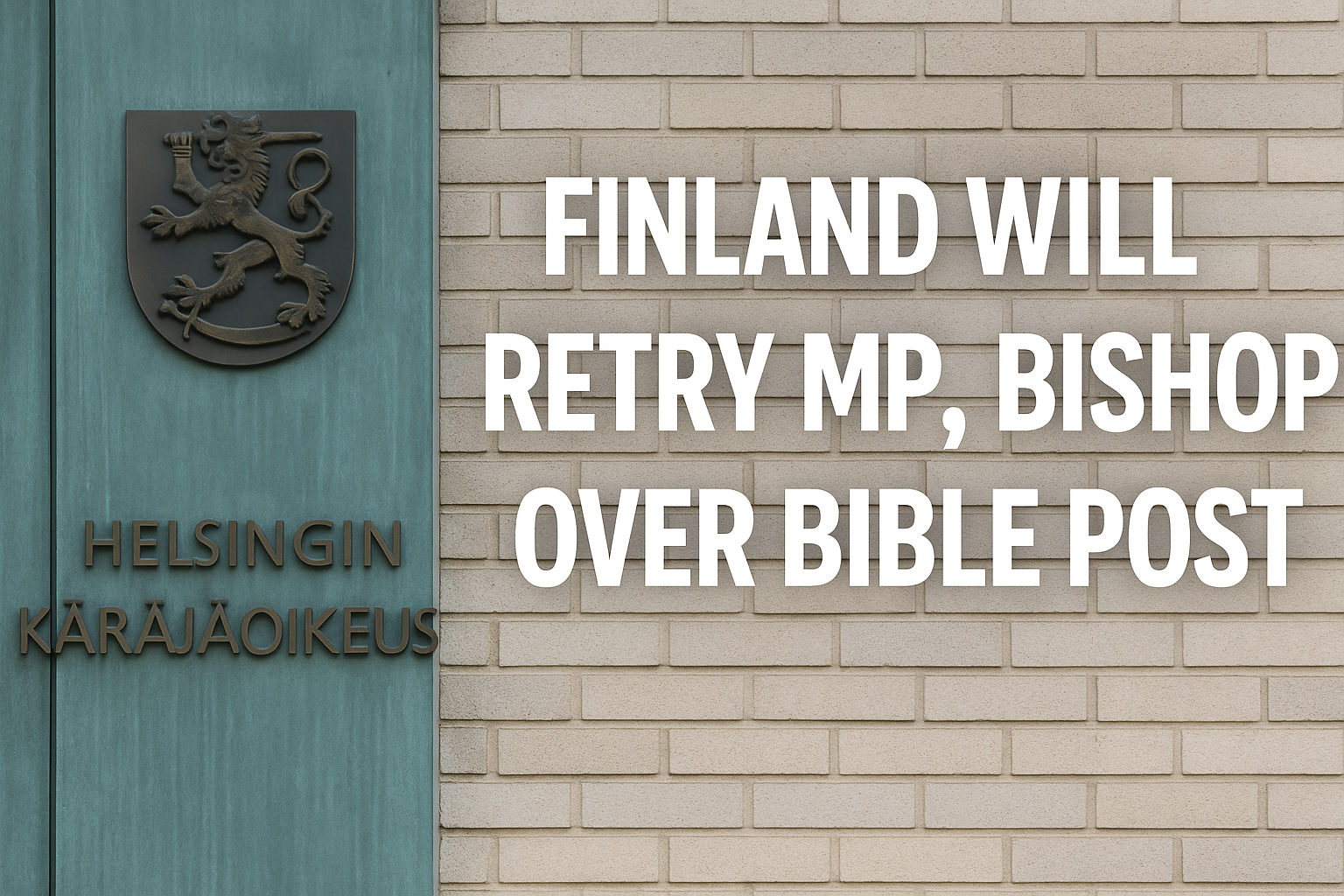The recent case in Finland where the Supreme Court reopened a trial against the parliamentarian Päivi Räsänen and the bishop Juhana Pohjola has set off alarm bells throughout the Christian world. Both face legal proceedings for having publicly expressed biblical teachings on human sexuality. The reason? They are accused of "hate speech" simply for relying on what the Scriptures teach on the subject.
This next October 2025Finland's highest court will rehearse the case, despite lower courts having previously acquitted the defendants. This judicial insistence reveals the growing pressure from sectors seeking to redefine morality and silence Christian voices in the public sphere.
A case that transcends borders
Räsänen, a physician and Lutheran parliamentarian, published a pamphlet on biblical sexuality in 2004 and shared a passage from Romans on Twitter in 2019. Bishop Pohjola, who endorsed the publication, was also charged. Although lower courts ruled that quoting the Bible does not constitute a crime, the Supreme Court decided to reopen the case, potentially setting an international precedent.
Scripture reminds us:
“Blessed are you when people revile you and persecute you and falsely say all kinds of evil against you for My sake” (Matthew 5:11).
Hate laws: protection or persecution?
The so called hate speech laws In Finland, they were originally designed to protect minority groups against real threats of violence. However, in practice, their application has become a mechanism for criminalize Christian convictions.
In the case of Räsänen and Pohjola, the State interprets the biblical exposition on sexuality as a “harmful” attack on the dignity of people, equating the proclamation of Romans 1 or Genesis 1:27 with incitement to hatred.
This is problematic for several reasons:
- It confuses violence with conviction: equates citing or preaching a biblical text with attacking a person.
- It redefines pluralism: Only views aligned with the dominant ideology are accepted, excluding the Christian faith from public debate.
- It creates a self-censorship effectChristian pastors, teachers, and doctors are afraid to express their faith for fear of legal consequences.
- It opens the door to more censorshiptoday it's sexuality, tomorrow it will be the right to defend life from conception or to reject euthanasia.
The apostle Peter exhorts us:
“It is necessary to obey God rather than men” (Acts 5:29).
In términos bioéticos, esta tendencia implica un giro alarmante: si el Estado define el bien y el mal moral, entonces se despoja a la sociedad de un diálogo plural y verdadero. En vez de un debate libre sobre temas como sexualidad, familia, vida o muerte, se impone una visión oficial que considera intolerable toda voz distinta.
Puerto Rico and the importance of the Religious Freedom Act
While faith is criminalized in Europe, Puerto Rico took an important step with the approval of the Law No. 14 of 2025 – Law on the Fundamental Right to Religious FreedomThis law recognizes religious freedom as a fundamental right, applicable to all citizens, including government employees, students, hospitalized patients, and even those confined in prisons.
Its main elements include:
- Protection against undue burdens from the State: no law may restrict religious freedom unless the government demonstrates a compelling interest and there is no less burdensome means to achieve it.
- Guarantees in education: students may express religious beliefs in school work, clothing, accessories, and activities, and teachers may engage in expressions of faith outside of their official roles.
- Spiritual access in hospitals and nursing homes: it ensures that patients and residents can receive visits from religious leaders, even in emergencies such as pandemics.
- Reasonable accommodations at work: it compels the government to adjust conditions so that employees can live their faith without penalties.
- Right of legal action: any citizen whose right has been violated may sue the State and receive damages and fees.
This recognition is in full harmony with the Article 18 of the Universal Declaration of Human Rights, which establishes:
“Everyone has the right to freedom of thought, conscience, and religion; this right includes freedom to change his religion or belief, and freedom, individually or in community with others and in public or private, to manifest his religion or belief in teaching, practice, worship, and observance.”
In other words, while Finland attempts to restrict faith through hate laws, both international law and Puerto Rican legislation point to the need for protect and expand the freedom of citizens to live and express their faith in public spaces.
What can you do about it?
This isn't a distant issue unique to Finland. The trend toward using "hate speech" laws to silence Christian beliefs is already underway in many Western countries.
We invite you to:
- Get informed: read about the case of Räsänen and Pohjola, and understand its implications for all of us who believe in the authority of the Bible.
- Pray: ask God for strength for persecuted Christians, discernment for the leaders of our churches and justice for those affected in this case in Finland.
- Take actioncontact your legislators in Puerto Rico and the United States. Let them know that you support religious freedom and reject any attempt to criminalize biblical teaching.
- Defend true pluralism: promote laws like Puerto Rico's, which ensure that no faith is silenced and that public debate remains open.
Food for Thought
History shows us that when God's Word is restricted, the entire society loses. The Gospel is not hatred, it is transforming love. To remain silent in the face of these judgments would be to abdicate our prophetic responsibility.
Let us remember Paul's exhortation:
“Do not conform to this world, but be transformed by the renewing of your mind” (Romans 12:2).
In times of trial, the Church is called to be light and salt. What is happening in Finland today reminds us that tomorrow it can happen hereThat's why we must be vigilant, firm in the truth, and active in defending our faith in the public square.



